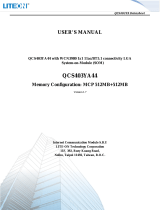
7
11.2 Software Installation
The SW driver is already installed to host device software platform which is a Linux/Android
OS. Proper country information must be selected from UI during first time boot up settings. Country
information is used to disable (deactivate) channels/frequency ranges which are not allowed by
country regulations.
12. FCC/IC Warning
The host integrator must follow the integration instructions provided by Vestel and ensure that
the composite-system end product complies with the FCC requirements by a technical assessment or
evaluation to the FCC rules and to KDB Publication 996369.
Host label shows the FCC and ISED identifier of the module. FCC and ISED identifier will be
visible on the back cover of the host device. Also, the modular transmitter meets only FCC and ISED
authorized for the specific rule parts, and the host must show complains with his own rule parts.
The module 17WFM21 has been tested and approved as a Modular Radio in accordance with
the appropriate FCC and IC standards. The supporting test data may be found in the modular test
report.
Since this module has been certified as a Modular Radio, this allows the end user to integrate
this module into an end-product without the requirement of re-certifying the radio module. The
module-integrator is responsible for the unintentional conducted and radiated emissions and must
verify that the integrated product is compliant with the rules associated with unintentional radiators.
The module integrator is also required to maintain an engineering record of the verification testing and
declare on the product through proper labeling and marking that the device is compliant with these
particular rules. Although already certified, radio tests according to KDB996369 clause 3.4 have to be
carried out also.
Installed module’s FCC ID and IC numbers need to be clearly marked on the product with the
following verbiage “Contains FCC ID: 2AVQS-17WFM21” and “Contains IC: 25888-17WFM21”.
This device complies with part 15 of the FCC Rules. Operation is subject to the following two
conditions: This device may not cause harmful interference, and this device must accept any
interference received, including interference that may cause undesired operation.
Changes or modifications not expressly approved by the party responsible for compliance
could void the user’s authority to operate the equipment.
Antenna connector ports are not for use on board. And module is only allowed to use with the
on board printed antennas.
Vestel provides user notices in both English and French when the product is made available
for sale and/or lease in Canada. This device contains licence-exempt transmitter(s)/receiver(s) that
comply with Innovation, Science and Economic Development Canada’s licence-exempt RSS(s).
Operation is subject to the following two conditions:
1. This device may not cause interference.
2. This device must accept any interference, including interference that may cause undesired operation
of the device.
L'émetteur/récepteur exempt de licence contenu dans le présent appareil est conforme aux
CNR d'Innovation, Sciences et Développement économique Canada applicables aux appareilsradio
exempts de licence. L'exploitation est autorisée aux deux conditions suivantes :
1. L'appareil ne doit pas produire de brouillage;









